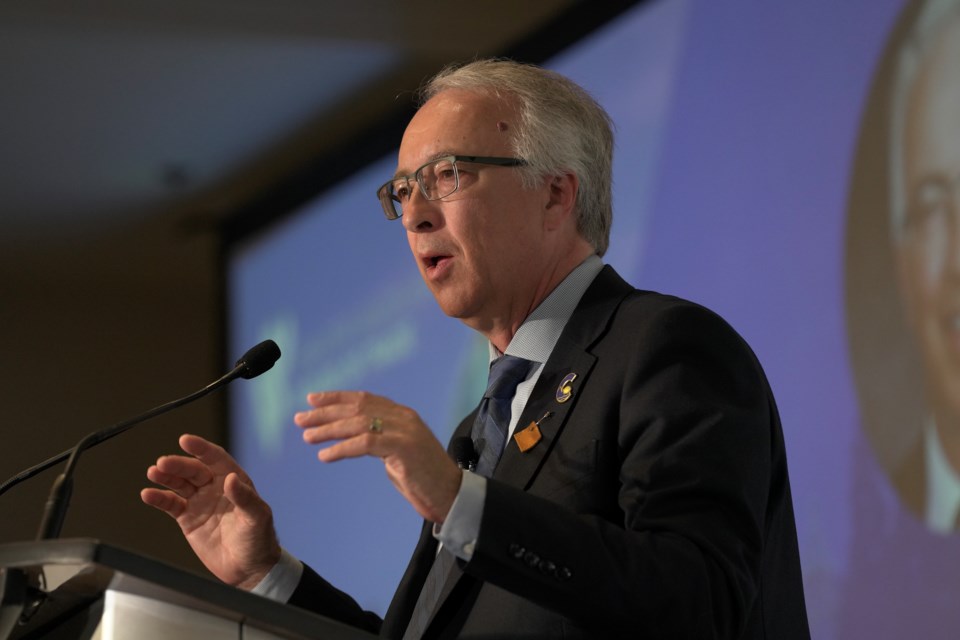BC Conservative leader John Rustad had been building for months to his announcement Sunday that he’d close B.C. safe injection sites and replace them with addiction intake facilities. He’s been hinting at the move for most of the year, as his drug policies emerged in dribs and drabs. The culmination occurred before a major rally in Surrey on Sunday.
“These inhalation sites, they're not safe, these injection sites as well. Enough of the drug dens. We need to be converting them over to make sure they're connected with recovery,” Rustad told me.
There are 48 supervised consumption and overdose prevention sites in B.C. Rustad said he could foresee leaving a small number open temporarily during the transition to treatment intake sites, but they could not be disruptive to neighbourhoods.
“I mean, look, the intention is here to link people to recovery,” he said.
“We have to stop the drugs. Doctors are telling me that the street drugs that are out there today, within two to three years, can cause permanent brain damage. Once that starts happening, there may be no path back to recovery. We need to end this rate as soon as we can.”
The idea drew immediate condemnation from NDP leader David Eby and Green leader Sonia Furstenau.
“When you close these sites, people don't stop using drugs — in fact, they have less contact with the people who can help them get into recovery and rebuild their lives,” Eby said at an event in Langley.
“And so all of a sudden they're using drugs in the community, in parks, in the doorways of businesses in alleyways, and they're more vulnerable to contracting HIV and hepatitis and dying of overdose.”
He accused Rustad of playing politics with people’s lives, and for supporting the idea of supervised injection sites just two weeks ago at a town hall in Richmond.
Furstenau pointed out Rustad was part of a 2000s-era Liberal government that supported safe injection sites.
“Did John get spun by his backroom federal Conservative strategists or did he just wake up and decide that further endangering the most marginalized British Columbians was the best path to power?” she said in a statement.
“Either way, he should be ashamed of himself.”
The Conservatives, though, are anything but.
The move on safe injection sites is but the latest attempt to reverse NDP drug policies and capitalize upon public fatigue at two years of rising street disorder and open drug use.
Conservatives have said they will curtail so-called “safe supply” of government replacement drugs, like hydromorphone, due to concerns they are being diverted on the street for resale by organized crime.
Rustad has pledged to fully end decriminalization, close hospital vending machines that dispense crack pipes and cocaine-snorting kits, shutter new drug inhalation sites opening in places like Vancouver and invoke involuntary treatment laws for those who repeatedly overdose.
Also, the Conservatives have publicly called for provincial health officer Dr. Bonnie Henry to be fired over her recommendation the province move toward regulating and one day selling hard drugs through retail stores like cannabis.
Altogether, it’s a not insignificant series of reforms, upon which cancelling safe consumption sites now sits atop.
But what’s equally striking about all of it, is how many issues the BC NDP have already moved on, in an attempt to address simmering public dissatisfaction with their drug policies.
On safe supply, Eby has ordered chemical tracers to determine the extent of diversion, which he now admits is concerning; on decriminalization, the NDP underwent a full political retreat earlier this year; on the vending machines, Eby ordered them closed until a review could be conducted; on involuntary care, the NDP reversed course to match Conservative position; and on Dr. Henry, Eby has refused to consider her recommendation to regulate hard drugs and sidelined her in favour of his new addictions expert Dr. Daniel Vigo.
True, on safe consumption sites, the NDP and Conservatives remain far apart. For now, anyway. The way the NDP are reversing course on issues in this election, though, you never know.
Rob Shaw has spent more than 16 years covering B.C. politics, now reporting for CHEK News and writing for Glacier Media. He is the co-author of the national bestselling book A Matter of Confidence, host of the weekly podcast Political Capital, and a regular guest on CBC Radio.




